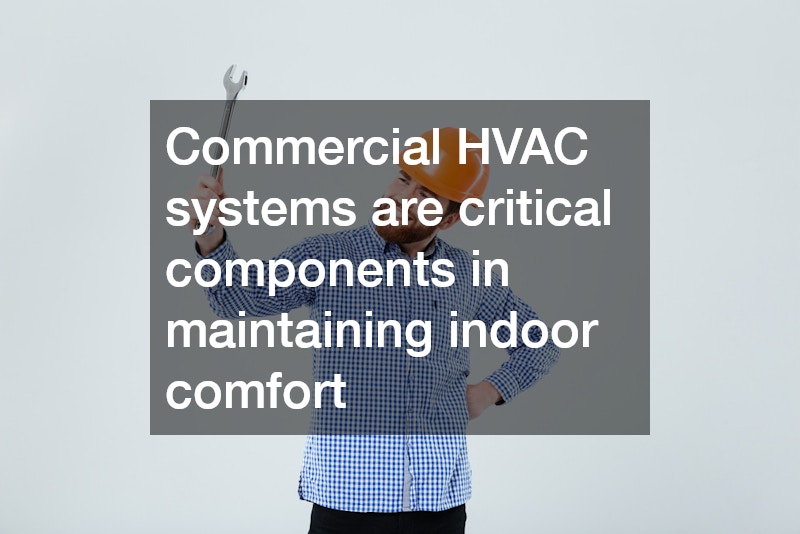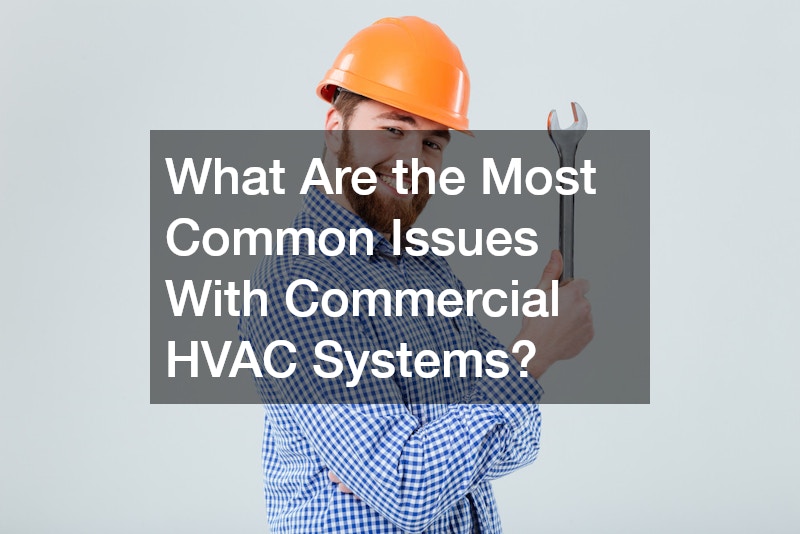Commercial HVAC systems are critical components in maintaining indoor comfort and air quality in businesses, office buildings, and industrial facilities. These systems are more complex than residential HVAC units, as they must handle larger spaces and often face more rigorous demands. As such, they are prone to a range of issues that, if left unchecked, can lead to system failures or inefficiencies.
Ensuring optimal performance of a commercial HVAC system is vital for energy efficiency and to minimize unnecessary expenditure on repairs and energy bills. Understanding the common issues these systems face helps building managers and maintenance teams implement timely interventions. Moreover, these insights enable the introduction of preventive maintenance programs that enhance system longevity and reliability.
To ensure business continuity and staff productivity, addressing HVAC issues swiftly and efficiently is a priority. Regular monitoring and professional inspections are essential practices that catch potential problems early. In this article, we will delve into some of the most prevalent issues faced by commercial HVAC systems and look at ways to resolve them effectively.
Inadequate Maintenance
One of the most significant problems with commercial HVAC systems is inadequate maintenance. Regular maintenance is essential to the optimal functioning of HVAC systems, yet it is often overlooked due to budgetary constraints or logistical challenges. When routine checks and scheduled servicing are ignored, components wear out quicker, leading to breakdowns and the need for costly repairs or replacements.
Proper maintenance of HVAC systems includes regular filter changes, lubrication of moving parts, and thorough inspections to identify minor issues before they escalate. Building staff should be trained to perform basic maintenance tasks, while a professional HVAC contractor should handle more complex inspections and repairs. By conducting scheduled maintenance, business owners can significantly extend the lifespan of their systems and reduce unexpected downtime.
Regular maintenance not only helps in preventing breakdowns but also ensures that the HVAC system functions efficiently, keeping energy costs down. It is crucial for facilities management teams to prioritize HVAC system maintenance within their operational budgets. In conclusion, well-maintained systems operate more efficiently and are less likely to suffer from unforeseen issues, leading to cost savings and improved comfort for building occupants.
Inefficient Airflow
Inefficient airflow is another common issue affecting commercial HVAC systems. This issue arises when air is not properly distributed throughout the building, causing uneven temperatures and discomfort among occupants. Blocked or dirty air filters, obstructed ducts, and improperly functioning fans are common culprits of poor airflow.
Identifying and resolving airflow issues requires a thorough assessment of the entire HVAC system. Technicians should check for blockages in ducts and ensure that fans are operating efficiently without unusual noises or vibrations. In many cases, simply replacing or cleaning air filters and adjusting damper settings can rectify airflow issues and significantly improve air distribution.
Inefficient airflow not only affects comfort but can also increase energy consumption. The system may work harder than necessary to maintain desired temperature levels, leading to higher operational costs. Ensuring adequate airflow can thus optimize system efficiency, reduce energy bills, and enhance indoor air quality by promoting proper ventilation.
Thermostat Malfunctions
Thermostat malfunctions are another issue plaguing commercial HVAC systems, often leading to inaccurate temperature readings and inefficient operation. A faulty thermostat cannot accurately gauge the ambient temperature, resulting in overcooling or overheating within the building. This can lead to discomfort for occupants and increased energy consumption.
Thermostat issues can arise from worn-out components, outdated technology, or incorrect settings. To resolve these problems, it may be necessary to recalibrate the thermostat or upgrade to a more advanced model that offers programmable settings for greater control. Building management should ensure that thermostats are installed in optimal locations away from heat sources or drafts to prevent inaccurate readings.
Regular inspections and maintenance of the thermostat are essential to maintain system efficiency and comfort levels. For commercial buildings, adopting modern thermostats that offer remote access and energy-saving modes can be an effective solution. Addressing thermostat malfunctions helps in achieving optimal temperature control, thus improving comfort and reducing unnecessary energy usage.
Refrigerant Leaks
Refrigerant leaks are a common issue with commercial HVAC systems that can seriously impair cooling performance. When refrigerant levels drop due to leaks, the system struggles to remove heat, and cooling efficiency is compromised. Detecting and addressing refrigerant leaks promptly is crucial to avoid extensive system damage and high repair costs.
Common causes of refrigerant leaks include corrosion, physical damage to refrigerant lines, and poor installation techniques. Regular inspections by qualified HVAC technicians can help identify leaks early on through the use of specialized tools and techniques. Once leaks are detected, proper repair and recharging of the refrigerant are necessary to restore cooling efficiency.
It is important for building operators to adhere to environmental regulations concerning refrigerant handling and disposal. Not only does this mitigate legal risks, but it also reduces environmental impact. Ensuring adequate refrigerant levels improves system performance, maintains indoor temperatures, and helps in achieving energy efficiency goals.
Electrical Issues
Electrical issues are common in commercial HVAC systems, often manifesting as power losses, tripped breakers, or irregular system operation. These problems can stem from faulty wiring, aging components, or power surges that damage sensitive electrical parts. Quick identification and resolution of electrical issues are crucial to preventing further damage to the system.
Building staff should be vigilant in identifying signs of electrical problems, such as unusual noises, frequent on-and-off cycles, or burnt smells emanating from the HVAC unit. A qualified electrician or HVAC technician should be engaged to inspect the electrical systems and make necessary repairs. Installing surge protectors and ensuring proper grounding of electrical components can protect the system from future electrical problems.
Regular electrical maintenance checks can enhance the safety and efficiency of HVAC operations. By preventing electrical failures, businesses avoid costly repairs and potential operational downtime. Ensuring the integrity of electrical components is a key step in maintaining the overall health and efficiency of commercial HVAC systems.
In conclusion, commercial HVAC systems are prone to a variety of issues that can impact performance, efficiency, and comfort levels within buildings. Understanding these common issues is crucial for effective maintenance and management of HVAC systems. Engaging skilled professionals for regular inspections and maintenance can prevent major disruptions and extend the lifespan of the system.
Regular maintenance, efficient airflow, well-functioning thermostats, adequate refrigerant levels, and stable electrical systems are all crucial aspects to consider for optimal HVAC performance. Investing in these areas not only enhances system efficiency but also reduces operational costs and environmental impact. Businesses should prioritize proper HVAC management to ensure a comfortable and productive environment for all occupants.
By addressing these common issues with commercial HVAC systems, building operators can achieve significant improvements in energy efficiency and system reliability. It is essential to adopt a proactive approach in identifying and resolving problems before they escalate into costly repairs. Overall, a well-maintained HVAC system is integral to the success and sustainability of any commercial facility.


